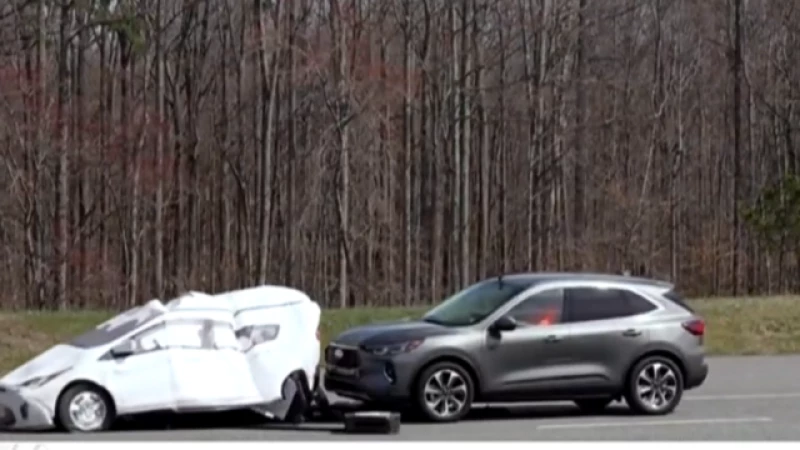Recent crash tests conducted on popular small SUVs showcased the challenges faced by driver assistance systems designed to prevent or minimize the impact of a crash, especially at higher speeds.
The latest results from the Insurance Institute for Highway Safety's new vehicle-to-vehicle front crash prevention test, revealed that the majority of models did not meet the desired performance levels.
"We aimed to set higher standards for manufacturers, which is why we raised the test speeds," mentioned David Aylor, the President of the institute.
Prior to this, the IIHS had evaluated similar driver assistance systems for low-speed crashes ranging from 12 to 25 miles per hour. By 2022, all systems tested had received excellent ratings.
The recent tests involved speeds between 31 to 43 miles per hour and also assessed the ability of small SUVs to detect and alert drivers about stationary motorcycles or large trucks. The results indicated areas where enhancements are necessary.
"Regrettably, only a few vehicles performed satisfactorily," Aylor remarked.
As per the IIHS, multiple trials were conducted as part of the new testing system at speeds of 31 mph, 37 mph, and 43 mph.
Among the tested models, only the Subaru Forester achieved the highest ratings in the updated test, successfully avoiding collisions at all speeds and providing timely alerts to the driver about potential obstacles.
"That's why we release these ratings to really encourage manufacturers to improve their performances across the board," Aylor said.
Two other small SUVs, the Honda CR-V and the Toyota RAV4, rated acceptable.
Three vehicles, the Ford Escape, Hyundai Tucson and Jeep Compass scored marginal.
The Volkswagen Taos, Mitsubishi Outlander, Chevrolet Equinox and Mazda CX-5 rated poor.
"Obviously, crashes that happen at higher speeds are more dangerous," said David Kidd, a senior research scientist with IIHS. "Deadly underride crashes often occur when the struck vehicle is a large truck, and motorcyclists are frequently killed when they're rear-ended by a passenger car, since their bike offers no protection from the impact."
General Motors, Mazda, Mitsubishi Motors and Volkswagen released the following statements to CBS News regarding the test results.
General Motors
"We are confident in the safety of the Chevrolet Equinox that achieved a 5-star safety overall rating from NHTSA's comprehensive New Car Assessment Program. We appreciate the IIHS's introduction of new front crash prevention test protocols and will look to incorporate the findings into our designs."
Mazda
"Mazda is constantly seeking ways to enhance our advanced driver assistance features, particularly the automatic emergency braking systems that have undergone rigorous testing by IIHS at higher speeds and with various obstacles. We are currently assessing IIHS's new front crash avoidance criteria and are confident that we can achieve even higher ratings in the near future."
Mitsubishi Motors
"Mitsubishi Motors vehicles consistently meet or surpass all mandatory safety standards in the US and have received accolades from IIHS for excelling in their testing procedures. The standards set by this particular test go beyond any existing safety regulations. While we are disappointed by the Outlander's performance in this test, we maintain our confidence in the Outlander's real-world safety technology, as evidenced by its 2024 IIHS Top Safety Pick rating."
Volkswagen
"At Volkswagen, the safety of our customers is paramount. Our driver assistance systems are designed to support drivers, but they are not a substitute for vigilant driving. Just as IIHS continues to raise the bar in their testing protocols, Volkswagen is committed to enhancing our driver assistance systems with each new model to provide better protection for our customers."







